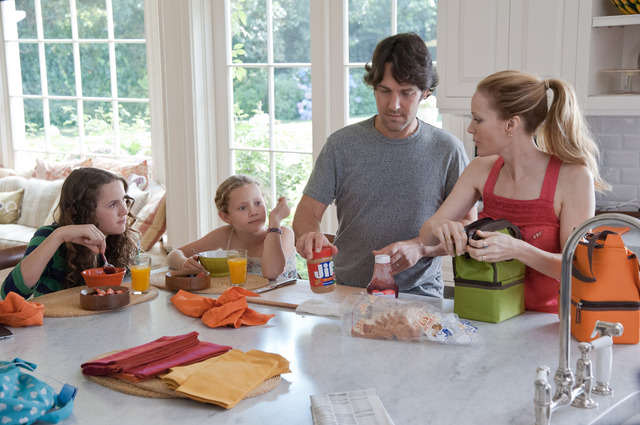Apatow Tells A Tale Of Truth With This Is 40
By Victoria Pietrus in Arts & Entertainment on Dec 23, 2012 4:00PM
 Judd Apatow's This Is 40 convincingly tells the tale of what happens when you officially enter middle age and are confronted with financial difficulty, smart children that might sometimes legitimately know better than you, and the strain of many years of marriage. A highly personal story no doubt inspired by Apatow’s own high and low moments, one of this film’s biggest mistakes is marketing it primarily as a tale of middle age crisis; instead, trailers and commentary should emphasize the surprising relatability to any age—it is a film about being vulnerable, taking emotional risks, and ultimately the acutely contradictory emotions experienced in a long-term relationship that is certainly not exclusive to middle age.
Judd Apatow's This Is 40 convincingly tells the tale of what happens when you officially enter middle age and are confronted with financial difficulty, smart children that might sometimes legitimately know better than you, and the strain of many years of marriage. A highly personal story no doubt inspired by Apatow’s own high and low moments, one of this film’s biggest mistakes is marketing it primarily as a tale of middle age crisis; instead, trailers and commentary should emphasize the surprising relatability to any age—it is a film about being vulnerable, taking emotional risks, and ultimately the acutely contradictory emotions experienced in a long-term relationship that is certainly not exclusive to middle age.
This Is 40 is a spin-off sequel to Knocked Up that updates audiences on bickering, troublesome Pete (Paul Rudd) and Debbie (Leslie Mann). It successfully borrows themes from its predecessor and presents them in a more mature, fleshed out way. Rudd and Mann (who is Apatow’s own wife) carry the weight of starring roles well, despite their overwrought, illogical, and occasionally irritating choices made regarding each other in Knocked Up. They are hard up for cash, on the brink of losing their home, and still driving each other crazy with their genuine but sometimes uncomfortable love/hate relationship. They both labor to overcome vices, as Debbie covers up her stress-smoking and Pete struggles to conquer a cupcake addiction, and the profound truth is that every single viewer has identical challenges. Pete is not completely honest all the time, and many couples often experience a similar desire to avoid conflict and/or let their counterpart down.
Reprising their roles at Pete and Debbie’s children are Apatow’s own Maude and Iris Apatow playing Charlotte and Sadie. Enough cannot be said about the hilarious irony and immense heart that these young actresses bring. They very capably evoke the challenges of growing up; Sadie isolates herself from her family for hours on end in watching Lost and is constantly lamenting the imposed restrictions on her Internet use, which could not be a more perfect reenactment of teenage behavior. Charlotte is sweet and constantly fighting for attention, a performance equally as spot on and genuine. There is a scene where Debbie and Charlotte (who are in real life mother and daughter) cuddle in bed and whisper such authentic mother-daughter things that are not prepared lines at all but honest-to-goodness remarks that would take place between two people. It’s so unlike anything a viewer will witness, and the real-ness of it is incredibly touching.
Apatow is known for his willingness to let actors riff, and true to form, there are parts where this isn’t quite as natural as he would want viewers to think. Many scenes are too long, and you will find yourself quietly urging the events to move faster.
The supporting cast is stellar and amply provides small, consistent moments of brilliance. Jason Segal plays a slimy personal trainer, Megan Fox is a hot and attention-grabbing employee, Chris O’Dowd is a surly and sarcastic employee, Melissa McCarthy is a convincing brash, irate mother and adversary, Albert Brooks is Pete’s oblivious, mooching father, and John Lithgow plays Mann’s distant yet compellingly vulnerable father. It is difficult to attain a supporting cast with such depth and character development, but this is accomplished well.
Much can be said about the annoying upper-class privileged set of problems, but this movie is a film about family and conflict that will resonate with any viewer. Apatow has returned here with an obvious calling to present the facts and make you laugh from deep in your belly in the process.